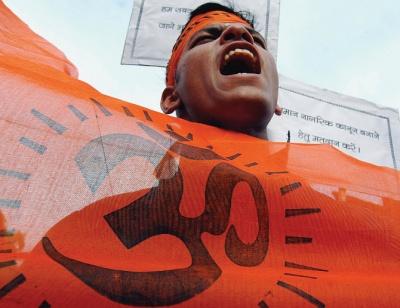'What his minions do, we are not sure, but he has got to keep them under control. Pogroms against Muslims in India -- I don't think that is going to be his policy.' Aziz Haniffa/Rediff.com reports from Washington, DC.
 A Narendra Modi-led government would offer opportunities instead of danger for United States-India relations, believes Stephen P Cohen, who heads the Brookings Institution's South Asia Programme and has written, taught, and helped develop US policy for the subcontinent for nearly five decades.
A Narendra Modi-led government would offer opportunities instead of danger for United States-India relations, believes Stephen P Cohen, who heads the Brookings Institution's South Asia Programme and has written, taught, and helped develop US policy for the subcontinent for nearly five decades.
He also predicts that India, which he says has not hitherto "squeaked at all," may do so with a vengeance with the advent of a Modi foreign policy. He was speaking to a packed audience at a Brookings conference on Re-imagining India, which was jointly hosted by the Asia Society and McKinsey & Company.
"India has not squeaked at all and squeaking wheels get the grease and India's got to be squeaking loud," Professor Cohen said. "It's got to be doing things, some risky, some dangerous, some positive."
This, he said, was exactly what a Modi government may do with a revamped Indian foreign policy. "American policy will have to reconsider its attitude toward India as India is going to attract more attention and America's going to have to adjust to that administratively, politically and strategically -- which it has not so far," he added.
"The first task for Modi would be to aggressively seek to transform India's economy," Professor Cohen said.
For that, he speculated, Modi might seek a close economic relationship with China and this could even lead to Beijing playing the role of a facilitator in resolving the India-Pakistan imbroglio, essentially marginalising the US.
"Modi has close relations with China, Japan, and South Korea, and bad relations with the US," Professor Cohen said. "I think he is going to expand this into a strategic advantage for India -- that is, he's going to use the economic relationship he has with East Asia, especially China, to enhance India's power and also in a sense, the original Nehruvian dream of India becoming one of the five-six major countries in the world."
Modi would be "tougher toward China, but also more cooperative," Professor Cohen felt. "He will use the new relationship with China to gain influence over Pakistan, over the US, and generally he will use the muscle that India becomes a military power as well as a talking power. That's going to be his strategy."
Unlike foreign policy analyst Strobe Talbott's argument, who predicted continuity in India's foreign policy, Professor Cohen felt, "You will see major changes in foreign policy."
On China as an India-Pakistan mediator, he noted, "It is in China's interest to see normal relations between India and Pakistan. The Chinese have a huge investment in Pakistan -- enormous political, economic as well as military (investment). In a sense, China can play the role I imagine for them of the US playing. But I don't see anybody in the US seeing that role."
Cohen shrugged aside fears of communal tension after Modi came to power. "Analogous to Pakistan's nuclear policy, we worry about future behaviour, not past behaviour," he said. "Modi understands very well that he must maintain normalisation within India."
"What his minions do, we are not sure, but he has got to keep them under control as well. So, I think he will be more worried about future behaviour. Pogroms against Muslims in India -- I don't think that is going to be his policy," Professor Cohen added.
The danger for Modi as prime minister, Professor Cohen felt, will be from "his right and the belief, the theory that America and the United Kingdom are in a conspiracy against India trying to undercut India by being anti-Hindu. They cite The Economist editorial and so forth, saying that there is a plot led by Western missionaries to really attack Hinduism and India. So there's a danger of a backlash there as well."
"He will have to defend himself from his right and these extremists position, which is a totally incorrect interpretation of Western policy."










